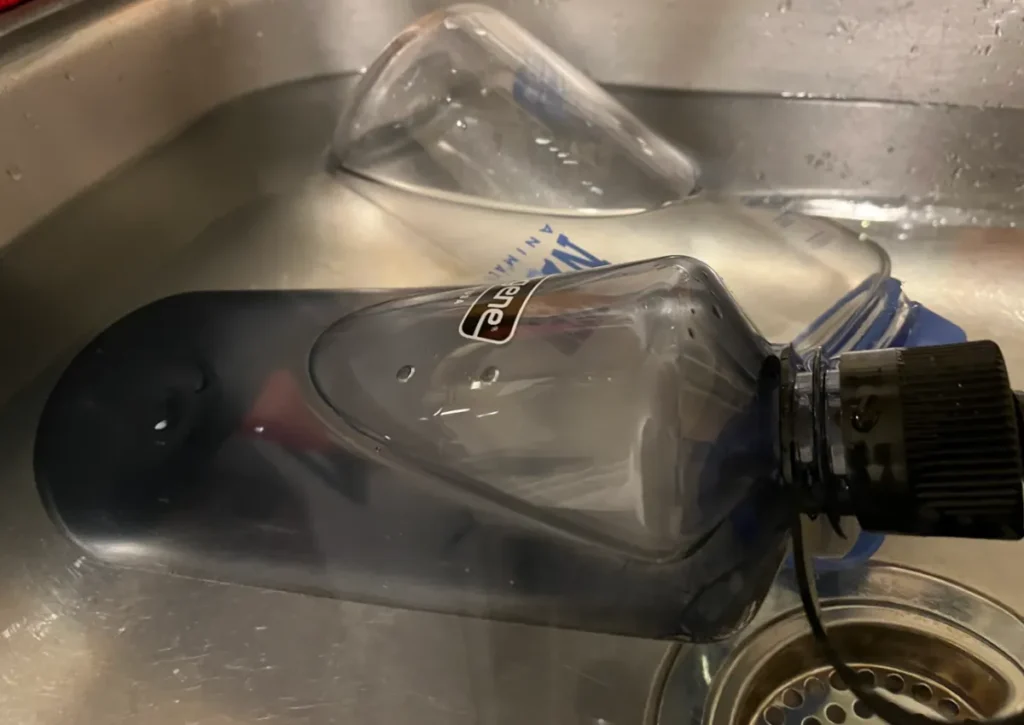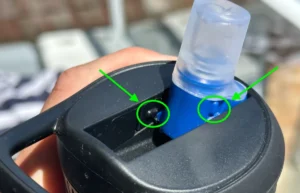My kids and I went tubing a few weeks ago and (as I should have predicted) my sons flipped their tube about three minutes in.
My oldest son’s Nalgene bobbed to the surface a few moments later but my younger son’s was nowhere to be found.
I eventually dug it out from the bottom of the river, but it made me wonder why one Nalgene floated and the other sank like a rock.
Empty Nalgene Bottles float. Filled Nalgene Bottles, on the other hand, will sometimes float and sometimes sink, depending on what you have in the bottle, how full it is, what type of water your bottle is in, and whether or not the lid is sealed.
As it turns out, my older son’s Nalgene floated because he had already drunk about ⅓ of his water. My younger son’s bottle sank because his was still completely full of juice (and sugary drinks are denser than water, causing the bottle to sink).
A Quick Lesson In Buoyancy
There are two main factors that determine whether or not an object sinks or floats, density and the amount of water the object displaces.
To put it simply, density is how tightly an object's molecules are packed.
Generally, when an object is more dense than the water surrounding it, it sinks. When the object is less dense than the water surrounding it, it floats.
HDPE and Tritan, the plastics modern Nalgene Bottles are made of, are both more dense than water.
But doesn’t that mean that even empty Nalgene Bottles should sink?
Not quite.
This is where the second factor, displacement, comes into play. For an object to sink, it also needs to be able to displace an amount of water equal to its size.
Picture yourself dipping into a hot tub (sounds nice right?). The water level of the tub rises the further you go in because more water is being moved aside, or displaced, the further in you go.
The force of the water being displaced pushes back upward against the object — so the larger an object is, the more dense it needs to be to sink.
Because empty Nalgene Bottles are so large compared to their density (thanks to all that empty space inside the bottle), they float easily. But if you were to melt a Nalgene Bottle into a ball of plastic with no empty space, it would sink because of its high density and small size.
Likewise, filling a Nalgene Bottle also increases its total density relative to its size. Which is where the question of ‘does a Nalgene Bottle sink or float?’ gets a little more complicated.
Nalgene Bottles Float… Sometimes

So we know that an empty Nalgene Bottle will float (which is why I always keep my wallet and keys in one if I have them out on the water), but what about a filled Nalgene?
That answer depends on a few things.
How Full The Bottle Is
The amount of liquid in the bottle has the biggest effect on whether your Nalgene sinks or floats. A Nalgene filled to the brim will almost always sink, while a half full bottle will typically float.
In my testing, a Nalgene filled with water, in freshwater, floats when filled about an inch below the neck and sinks if any more full.
What’s In The Bottle
The liquid you have in the bottle also has an effect on how buoyant your Nalgene is.
Sugary drinks like juice and soda are more dense than plain water and more likely to sink. Diet soda, on the other hand, is less dense than water and is actually more likely to float.
This can be seen clearly in the video below showing a can of regular coke (with sugar) vs a can of diet coke.
If you have any ice in your bottle, it’s also less dense than water — so the more ice in your drink, the more likely it is to float.
What Your Bottle Is Floating In
In addition to the water inside your bottle, the water on the outside of the bottle has an effect.
Salt water is denser than freshwater, so Nalgenes float much easier in the ocean than in freshwater lakes or rivers, even if they are completely filled with water all the way to the top.
The saltier the water, the more likely your Nalgene is to float.
Just like how people can float extremely easily in the dead sea because it's so salty your Nalgene bottle full of fresh water will float in salty water.
If The Lid Is Sealed
And lastly, it matters if your Nalgene lid is closed or not. An empty Nalgene with the lid open will slowly take on water and eventually sink as it fills.



